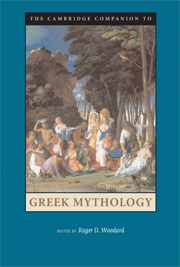Book contents
- Frontmatter
- Introduction: Muthoi in Continuity and Variation
- Part I Sources and Interpretations
- 1 Lyric and Greek Myth
- 2 Homer and Greek Myth
- 3 Hesiod and Greek Myth
- 4 Tragedy and Greek Myth
- 5 Myth in Aristophanes
- 6 Plato Philomythos
- 7 Hellenistic Mythographers
- Part II Response, Integration, Representation
- Part III Reception
- Bibliography
- Index
6 - Plato Philomythos
from Part I - Sources and Interpretations
Published online by Cambridge University Press: 28 March 2009
- Frontmatter
- Introduction: Muthoi in Continuity and Variation
- Part I Sources and Interpretations
- 1 Lyric and Greek Myth
- 2 Homer and Greek Myth
- 3 Hesiod and Greek Myth
- 4 Tragedy and Greek Myth
- 5 Myth in Aristophanes
- 6 Plato Philomythos
- 7 Hellenistic Mythographers
- Part II Response, Integration, Representation
- Part III Reception
- Bibliography
- Index
Summary
The devotee of myth is in a way a philosopher, for myth is made up of things that cause wonder.
Aristotle, Metaphysics 1.982b 18-19The luxuriant varieties of definitions of Greek “myth” are a symptom of the remoteness of our culture from the culture of ancient Greece. We have no real equivalent for the traditional stories and histories that circulated among the Greeks (and Romans) concerning their origins, the origins of their world, their gods and the progeny of their gods, the relation between humans and animals, and the fate awaiting mortals after death. The term myth now carries a pejorative sense in modern languages, as is evident from the use of the word in titles such as Wilhelm Nestle’s Vom Mythos zum Logos: Die Selbstentfaltung des griechischen Denkens (1941) or Ernst Cassirer’s The Myth of the State (1946), to name only two philosophical titles from the middle of the last century. In Homer, mythos is aword that describes something said in the epic. But already in Herodotus the word mythos had come to describe an idle and unbelievable tale. The tradition concerning Oceanus and the Greek traditions concerning Heracles are cases in point; both are mythoi (Histories 2.23.1 and 2.45.1). Yet Herodotus' predecessor, Hecataeus of Miletus, can describe his own history as a mythos (FGrH 1 F 1 Jacoby) and, conversely, traditional but misleading historical accounts as logoi.
- Type
- Chapter
- Information
- The Cambridge Companion to Greek Mythology , pp. 210 - 236Publisher: Cambridge University PressPrint publication year: 2007

